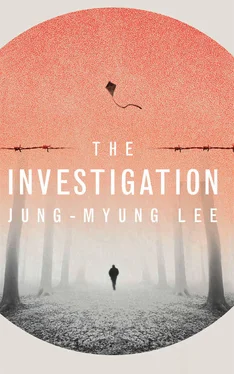Hasegawa was pleased. To encourage participation, he decided to exempt volunteers from labour and give them an additional meal a day. Morioka excused Midori from her medical duties in the afternoons, to allow her to conduct the auditions and oversee practice.
The auditions took place over a week. Each volunteer was escorted to the auditorium, where Midori observed as the prisoner vocalized. She recorded her opinion on the prisoner’s tone, vocal strength and suggested chord-part in a meticulous log, and seventy-odd prisoners were selected. She launched an even more detailed and complex second evaluation, checking to see if the candidates could sing precise notes. Many men’s voices cracked on the higher notes; others had no sense of rhythm. Three days later, she had thirty men, ten each assigned to baritone, bass and tenor. Prisoners with excellent vocalization and tone were to be leaders. A Korean, who’d been taking preparatory courses at Ueno Music School before being sent to prison for his ideology, was made the concert master. Hasegawa allowed the singers to change cell assignments so that everyone in the same vocal group was together. On Mondays, Sugiyama went out to the cells, put manacles and shackles on the singers and led them to the auditorium, where he stayed to observe them. He also listened carefully to the piano, in case it needed tuning.
The auditorium erupted into chaos during the first practice — the singers didn’t know how to read music and they didn’t have even a basic understanding of how scales worked. Verdi’s opera was ill-fitted to men who didn’t know what sheet music was. They were there solely for the perks. Midori asked the warden to allow the prisoners to shed their manacles. With their hands bound together, she argued, the prisoners were forced to lean forward, compacting their lungs and making it difficult to draw in a breath or vocalize.
Hasegawa scoffed. ‘And what will you do if they riot?’
Midori slammed both hands down on the keyboard. The majestic roar of the piano curtailed the jungle of the men’s murmuring.
‘Fine!’ Hasegawa said. ‘But not the shackles.’
The singers, their hands freed, stood around looking lost. Midori handed out sheet music to the leaders. She played the melody of ‘Va, pensiero’ over and over again, familiarizing each part with what they would be singing.
For weeks the auditorium was a crucible of cacophony. Voices cracked, tangled and flipped. Vocalizations were terrible. The prisoners seemed incapable of singing a simple lullaby, let alone the magnificent Verdi. Midori played the piano tirelessly, correcting the prisoners’ vocalizations, giving suggestions on how to breathe deeply. Slowly, the mass of noise turned into sound, and the sound into music. The men could hear their own voices, once lost. Singing was no longer performed for special treatment; the prisoners were recovering their lost selves. Their voices told them who they were. After practice, they lined up as tenors, baritones and basses. Sugiyama counted the men, manacled them and shouted, ‘Return to cells. Forward, march!’ The line of prisoners snaked along the corridor, back to their cells, and now they sang of their own volition. They practiced vocalization and harmonized with others in the adjoining cells. The thick walls couldn’t keep their voices apart. Each part began to shine.
Back in rehearsals, Midori carefully regulated the brightness and darkness, forcefulness and frailness, cold and warmth. The prisoners sang bluer than the sky, clearer than the wind and brighter than the stars. They concentrated on extracting the purest sounds from their bodies, like monks in meditation. Watching it all unfold, Sugiyama felt his heart warming; moved by beauty, he realized he was still human.
Each season brought grave disappointment — spring’s blooming leaves pushed prisoners into a deep depression, summer’s brutal temperatures and humidity overwhelmed them with sweat and swarms of mosquitoes, autumn’s falling leaves and cold wind reminded them of the coming temperatures and every second of winter bared its sharp teeth in attack.
One day in the late summer of 1944 Hasegawa and Maeda escorted Director Morioka and his team of doctors into Ward Three. A parade of white coats filled the corridors; never before had so many medical staff entered the ward.
From one end Hasegawa called out, ‘Open all cell doors!’
The guards dispersed with a loud thudding of boots. Keys jangled as locks turned. When the doors opened, the sour smell of sweat and filth rushed out. The guards lined up on each side of the corridor, equidistant from one another. Morioka gave a signal and doctors in masks and rubber gloves entered the cells, followed by the guards. ‘Special sanitation inspection!’ the guards called. ‘Strip!’
The prisoners glanced at one another warily as they took their clothes off. The hesitant were met with clubs. The prisoners lined up on either side of the cells facing each other. The doctors estimated each prisoner’s height and weight; with gloved hands they looked into their eyes and examined their mouths. Afterwards the doctors gathered in the corridor and submitted their inspection logs to Morioka, who left, leaving behind a sharp antiseptic smell.
Twisting the ends of his moustache, Hasegawa watched the medical team disappearing down the corridor. ‘End of sanitation inspection! Close the cell doors!’
Sugiyama looked on nervously. He knew that everything was a prelude to something else; no single incident existed in isolation. But he couldn’t tell what was about to happen, whether it would bring an unbelievable stroke of luck or terrible misfortune.
The following day Hasegawa ordered Ward Three prisoners to line up in the military training grounds. The tight ranks squeezed everyone’s freedom; nobody could burst out of line or fall behind. By obeying, the prisoners forced others to follow suit. Hasegawa looked down silently from the platform, appearing to enjoy the prisoners’ growing anxiety. Time was on the side of the powerful; the more one delayed, the more worried the powerless became. The prisoners watched the warden’s lips. A long time passed before Hasegawa spoke into the microphone: ‘You should all be grateful to the medical staff of the Kyushu Imperial University Medical School!’
The prisoners began to murmur.
Hasegawa paused, fanning their curiosity. ‘Thanks to the magnanimity of the Great Emperor of Japan, the best medical staff in the nation gave you an inspection. It was revealed that a large number of prisoners are suffering from ill health. The medical staff will provide free medical treatment to those prisoners.’
Hasegawa stepped away from the crackling microphone. A guard tacked a piece of paper filled with prisoner numbers on a bulletin board next to the platform. The prisoners crowded around it, the illiterate openly fretting. As Maeda opened a log and began to call out the numbers, the yard erupted in excited shouts.
Several men who were not selected crowded around Maeda.
A pale man walked up. From the yellowed whites of his eyes, it was clear he was jaundiced. ‘I’ve been suffering for a long time from anaemia,’ he said dejectedly. ‘Why are you helping people who are fine, but not me?’
‘You’re disqualified because you have a wound on your forehead,’ Maeda said. ‘But there will be more chances. The inspection will continue at regular intervals.’ He laughed arrogantly.
The prison hummed with cheers and laughter. Only those who weren’t selected were unhappy, as was one guard standing in the corner, nervously watching the celebrations.
Every time I walked into the censor office, I was on the lookout for any evidence of Sugiyama’s life. The desk, the bookcases and the boxes of documents weren’t illuminating, and the only other furniture in the office was an old wooden cabinet with a broken lock, squeezed in the narrow space between the bookcases and the wall, which Sugiyama used to store his clothes and personal effects. I opened the cabinet. Inside hung a well-ironed dress uniform, a brown winter uniform and two grey summer uniforms. The drawer near the bottom contained worn underwear, socks, gaiters and a few neatly folded handkerchiefs. A large box sat in the bottom, probably filled with dirty laundry. Right after the murder I’d taken an inventory of his things and noticed how everything was in perfect order, revealing Sugiyama’s obsessive personality. I closed the cabinet door. Something made me open it again. I took the top off the large box. It smelled sour — sweat and mould. Dirty laundry, like I’d thought. I caught sight of a pair of winter uniform trousers, dirt embedded in the baggy knees. It gave me pause. Come to think of it, the dust in the prison yard flew away easily. I examined the trousers hanging in the cabinet. The knees showed faint traces of having been dragged along damp dirt. I remembered the scratches on Sugiyama’s knees. What could that be about?
Читать дальше












